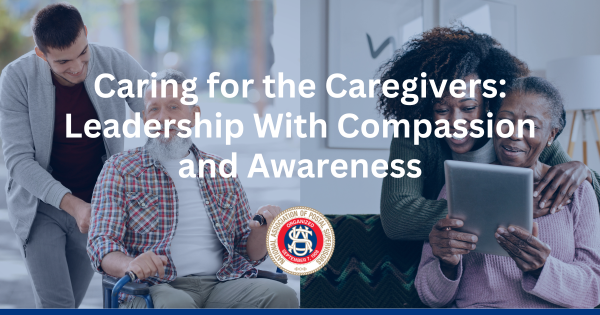Caring for the Caregivers: Leadership With Compassion and Awareness
Submitted by the USPS Employee Assistance Program
At the Postal Service, supervisors serve as the backbone of daily operations. You ensure the mail moves efficiently, safety protocols are followed and teams perform at their best.
But, beyond logistics and leadership metrics, you carry another equally vital role—supporting the human beings behind the work. Among them are caregivers—employees who, after clocking out, go home to care for aging parents, ill spouses, children with special needs or others who rely on them.
These dual responsibilities often create a silent struggle. While caregiving is a profound act of love and duty, it also can lead to chronic stress, emotional exhaustion and physical fatigue. And because USPS employees are among the most dedicated and resilient, many will try to push through without letting anyone know they’re struggling. But, over time, the pressure may show up in unexpected ways—missed time, irritability, fatigue, difficulty concentrating or even safety issues.
Recognizing the Warning Signs
As a USPS supervisor, you are uniquely positioned to notice these early warning signs—both in your employees and in yourselves. It’s important to understand that changes in an employee’s behavior are not always indicators of disengagement or poor performance. They may be signals of someone who is overwhelmed and trying to carry a hidden load. For example:
- Increased callouts or schedule conflicts might reflect not carelessness, but the unpredictability of caregiving at home.
- A shift in mood or energy could signal exhaustion, not lack of motivation.
- Emotional withdrawal or irritability may stem from stress that has nothing to do with work—and everything to do with personal responsibilities.
Creating a supportive work environment doesn’t mean taking on your employees’ personal problems. It means cultivating a culture of awareness, empathy and access to resources. A quick check-in or a reminder about the Employee Assistance Program (EAP) can go a long way.
The EAP offers confidential support, including counseling, stress management tools and referrals for caregiving services. When employees feel supported, they’re more likely to manage stress well, maintain engagement and stay safe on the job.
Support Starts With You
Many USPS supervisors are caregivers themselves. You’re expected to lead with consistency and strength, even when life at home is emotionally demanding or physically exhausting. The pressure to stay composed while managing personal caregiving responsibilities can take a heavy toll.
Know this: Asking for help is not a weakness—it’s a leadership strength. Recognizing your own limits and taking proactive steps to care for your mental, physical and emotional wellbeing is not selfish—it’s essential. When your wellbeing is intact, you lead more effectively, respond more compassionately and model healthy boundaries for your team.
If you’re navigating caregiving in your own life, take time to explore the support available to you. The EAP is not just a resource for your employees—it’s for you, too. Whether it’s a confidential counseling session, practical guidance or simply having someone listen, reaching out can be the first step toward restoring balance.
USPS Leadership Is Human-Centered
When you recognize and respond to caregiver stress—in others and in yourself—you strengthen the heart of our organization. You foster a culture of empathy and resilience that allows every team member to thrive, both at work and at home.
As a USPS supervisor, you not only are managing performance, you are stewarding people. And in caring for the caregivers, you demonstrate what true leadership looks like. You have the power to shape a culture where employees—and supervisors—don’t have to carry their burdens alone.
Take a moment this month to check in with your team. Look beyond performance and ask how they’re doing. Encourage use of the EAP. And if you are navigating caregiving challenges yourself, consider reaching out, as well.
Lead by example. And remember, caring for others starts with caring for yourself. Visit EAP4YOU.com or reach out to the EAP at 800-327-4968 (800-EAP-4YOU); TTY: 877-492-7341.
